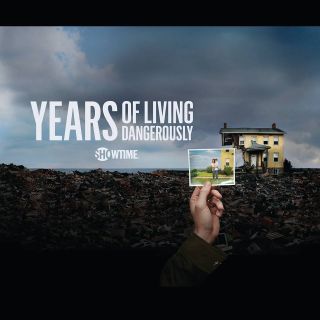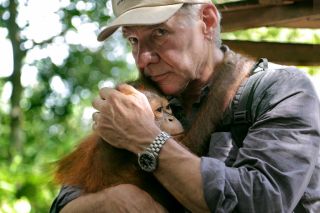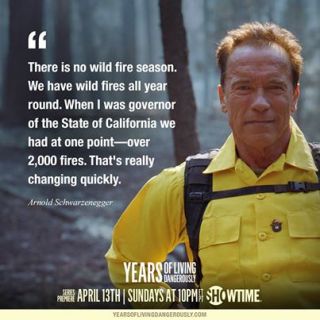Environment
Is the health system ready for Years of Living Dangerously?
Renowned professionals weigh in on the health impacts of climate change.
Posted April 11, 2014
Source: SHOWTIME/Years
"This is not just going to be a landmark climate change series, it is going to be a landmark *television* series, like Ken Burns’ The Civil War. It is what everyone is going to be talking about from April to June. As the latest international climate report makes clear, climate change is happening right here, right now — in America and around the world. It is the biggest story of our time, and it needs a big platform to tell it."
~ Joe Romm, Chief Science Advisor for YEARS

Source: SHOWTIME/Years
Is “the biggest story of our time” about to get the spotlight it deserves? More importantly, are we ready?
Years of Living Dangerously debuts on Showtime this Sunday night (10pm ET/PT). Already rave reviews are coming in, and you can watch it free online right now.
“It’s the biggest story of our time. Hollywood’s brightest stars and today’s most respected journalists explore the issues of climate change and bring you intimate stories of triumph and tragedy. YEARS OF LIVING DANGEROUSLY takes you directly to the heart of the story in this awe-inspiring and cinematic documentary series event from Executive Producers James Cameron, Jerry Weintraub and Arnold Schwarzenegger.” ~ The Center for American Progress
And Chris Hayes, MSNBC correspondent calls it "...the Oceans Eleven of Global Warming" detailing his own involvement in the show.
Meanwhile, John Abraham at the Guardian is “jealous that (he) did not get a chance to work on this – perhaps the most important climate change multimedia communication endeavor in history.,” and calls YEARS a “global warming blockbuster.” He goes on:
Climate change really is a made-for-TV story. It has all the drama of Hollywood, with real-life villains and heroes thrown in. We scientists struggle everyday to communicate the importance of climate change to the world. It is great to see communication experts come in and accomplish what scientists alone cannot.
That's why I'm excited about the biggest climate science communication endeavor in history. Airing this spring in the US (Showtime), a cast of the world's best climate scientists team up with the world's best politicians and actors to tell the stories of real people from across the planet affected by climate change…
Andrew Revkin, the respected author of DotEarth at the NYTs, says YEARS is, "… a compellingly fresh approach to showing the importance of climate hazards to human affairs, the role of greenhouse gases in raising the odds of some costly and dangerous outcomes and — perhaps most important — revealing the roots of the polarizing divisions in society over this issue…."
While George Marshall, an expert on climate and communication, notes, "What impressed me about the two episodes I watched was the respect that it showed to conservatives, evangelicals and ordinary working people…. it is still the best documentary I have seen."

Source: SHOWTIME/Years
Behind the scenes, leading correspondents and world famous celebrities like Harrison Ford share their passion about why they got involved. With such a hard-hitting, respected team this series may help launch a massive social upwelling for climate change action. It may also trigger far-reaching awareness on the psychological impacts of climate change. Are mental health professionals ready?
Psychologist, Dr. Lise van Susteren who specializes on the psychological impacts of climate change, doesn’t think so. She says, “National mental health system is not prepared for global climate change, the world is in denial!” Susterern is an advisory board member at the Center for Health in a Global Environment at the Harvard School of Public Health. She also co-authored a paper on the psychological impacts of climate change. On April 9, in advance of the Showtime release, Susteren and other professionals joined a press teleconference call titled, “Doctors Urge Viewers to Watch Showtime’s Climate Series with Friends and Family.” The call was part of a media outreach effort designed to support viewers with effective psychological tools to navigate the difficult realties of climate change and inspire them to work together towards solutions.
Susteren adds, “So far, little has been said about psychological impacts of climate change. We care about and are motivated to change by individual stories of loss…this series connects the bigger dots. But the emotional impacts are disturbing, which is why we suggest watching with others. The last thing we should do regarding climate change is sugar coat the message. We have to tell the truth. Still, we can expect fear, anger, despair and denial: these are all underpinnings of psychological climate response. And in some circumstances we’ve seen fully blown psychological traumas emerge.”
Dr. Catherine Thomasson, Executive Director of Physicians for Social Responsibility, agrees.
We feel climate change poses one of the most series threats to human health of this century. We need more people to wake up to the opportunity to address climate change, and this series is an excellent way to do that. We are asking everyone to watch the new series. And we are also urging people to view it with friends, family, and neighbors rather than watching it alone. This material can create feelings of helplessness. But by watching it together, we can turn these feelings into actions for positive change. A great way to do this is by joining one of the thousands house parties listed at 350.org. And learn more about health impacts of climate change, which we are already seeing, at Physicians for Social Responsibility.
George Marshall is the Director of projects and co-founder, Climate Outreach Information Network. Marshall speaks to the social psychology of the series:
It’s so important for people to get together for this because as human beings, we form our views by doing it together. It’s how we decide what our attitudes are and what we pay attention to…by scanning the people around us for their views. The science facts of climate change are important, but the social facts are equally important. The social milieu in which we receive this information affects the underlying structure and function of the brain. We can only move forward on climate change when we get the two halves the brain working together (the social half, and the rational/data half).
So far, people are not talking about climate change. There’s a widespread social silence. People rarely talk about it with anyone, even friends and family, and even in the media (consider the last presidential campaign). This silence is not giving us the social signal that we need to pay attention. Bringing people together is a big signal that it’s time to pay attention. We’re hoping this series and gathering will lead to a point of “conviction” which is a psychological state beyond what you know, to what you believe and act on. That expected psychological state of “conviction” is why there’s so much hope in this series.
Dr. Susteren also talked about working with children. “I’ve seen kids come in who won’t eat because they are worried they’ll use up the world’s resources and hurt others. It’s vital to know how to handle the psychology of climate change and its impacts on children.”

Source: SHOWTIME/Years
You can help kids by modeling the behavior changes, and giving them solutions to take home. Schools and other education centers can support activities to live more sustainably and be proactive about impacting climate change. It’s important to make it positive and help kids to joyfully embracing what they can do. And you can talk to them about what adults are doing, too. Consider the many scientists, journalists, celebrities, and others who've worked on the YEARS team and beyond, as well as the people close to home who work for change. It's also important to consider whether this material is age-appropriate for the child.
Alongside their outreach effort to general audiences and the mental health care system, the YEARS team partnered with educators and the National Wildlife Federation to create a "Climate Classroom" suite of curricula for Middle, High, and College Students. It includes "watch kits" and lesson plans. "The YEARS education materials are aligned to national standards for education and will correlate with the widely used K-12 Common Core State Standards. Importantly, these instructional materials will advance - now and in the future - newly developed Next Generation Science Standards that feature climate education as a goal for most schools over the next three to five years."
As people around the country rally to join watch parties with their family, friends, and neighbors, let's encourage mental health care professionals to consider how best to support them. If this series marks a global tipping point, it's part of a journey to confront the biggest challenge in human history.
LINKS:
- Years of Living Dangerously
- Showtime's Years
- Physicians for Social Responsibilty's "Climate Change Is a Threat to Human Health"
- Harvard School for Public Health: Program on Climate Change Impacts on Psychology
- Climate Classroom
- 350.org Year's Watch Parties
- The Green Boat: Reviving Ourselves in Our Capsized Culture (by pyschologist Mary Pipher)
Join the Mothering Nature conversation on Facebook and Twitter, and unleash your epic force for harmony on Earth.
© Rachel Clark. Reprint with the specific permission of the author.
A note on comments: I read and dearly appreciate every comment. I rarely respond in honor of devoting my time to writing, family, and community. Your comments are important to me, and may inspire future posts. Also, in respect to gold-standard science, I follow the policy of the LA Times and Popular Science (as further explained at CBSNews.com) and refuse climate-change denial comments.




